The Basset Hound, a distinguished member of the hound group, originates from San Hubert, France, where a noble passionate about hunting chose this breed for private expeditions. As the trend spread throughout France, it soon crossed borders and left its mark in Great Britain, acquiring an English touch that would define its evolution.
Exploring the Unique Varieties of Basset Hound dog
There are no different types of Basset Hound, as their unique short legs set them apart. However, we can distinguish the Basset Hound from the rest of the varieties in the Basset family:
Each variety has its own distinctive traits, but the classic Basset Hound remains a standout with its unique characteristics, especially the short legs that make it instantly recognizable.
Origin:
Basset Hounds have their roots in San Huberto, France, and later gained an English touch in Great Britain.
Lifespan:
On average, Basset Hounds live between 8-12 years.
Size:
Males: 36 cm
Females: 33 cm
Weight Range:
Males: 18 - 36 kg
Females: 18 - 36 kg
Characteristics:
Elongated back, dolichocephalic (elongated face), short arched legs, narrow eyes, naturally drooping ears, body wrinkles.
Expectations:
Energy Level: Relaxed
Drooling Tendency: High
Snoring Tendency: Low
Barking Tendency: Low
Digging Tendency: Low
Need for Attention/Socialization: Moderate
Bred for: Scent hunting
Coat:
The Basset Hound dog is known for a wide range of colours including white, black, brown, mahogany, cinnamon, red, and blue-black. Typically, tri-color combinations are common.
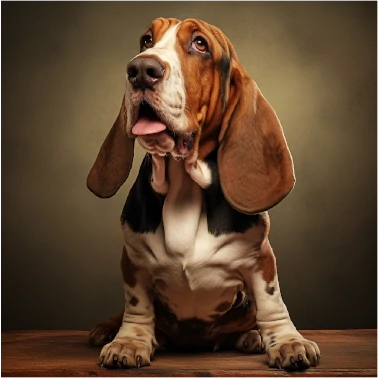
The distinctive appearance of the Basset Hound makes it an object of admiration worldwide. With a body notably longer than it is tall, these dogs are meticulously designed to track prey in challenging terrains. Their elegance and adaptability not only make them excellent hunting companions but also ideal pets.
A Story that Crosses Borders: The Basset Hound's Journey to England
After arriving in England, the breeding of these canines continued, adopting an English touch that contributed to their uniqueness. Although their origin is French, Basset Hounds in England have left a distinctive mark on their lineage, making them a charming combination of French elegance and English charm.
Basset Hound Today: From Hunters to Loyal Companions
Although their history is deeply rooted in hunting, most modern animal lovers choose to adopt the Basset Hound as a loving pet without necessarily paying attention to their tracking abilities. Their gentle nature and affection make them loyal companions, fitting perfectly into the home life.
Discover more about these fascinating canines and consider making the Basset Hound your next mate, blending history, elegance, and affection into one adorable pet.
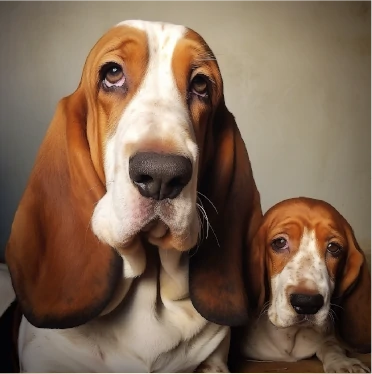
Basset Hound puppies are undeniably adorable bundles of joy. Their inquisitive eyes and enchanting expressions make them stand out as they eagerly explore their surroundings with a penchant for sniffing out every nook and cranny. Whether it's the standard Basset Hound or the seemingly calm-faced Basset Hound mini, these little canines exude alertness in their playful antics.
Nurturing the Playful Spirits: A Mix of Curiosity and Training
Despite their initially calm demeanor, Basset Hound dog puppies possess an innate curiosity and energy. Mini or standard, they revel in lengthy walks, embracing every opportunity to familiarize themselves with their new space. It's crucial to underscore the need for strict but affectionate training for these charming pups, known for their stubbornness and determination to get their way. Patience and love play pivotal roles in cultivating the best behavior in a Basset Hound.
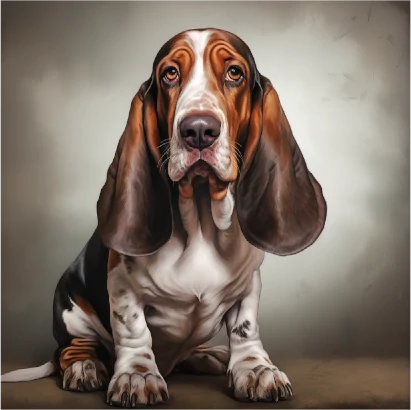
Basset Hounds, known for their uncomplicated and amiable character, effortlessly connect with both humans and fellow canines. While intelligent, their stubborn streak makes training a bit challenging. Despite their seemingly sad expressions, they are affectionate companions, especially with children. Their affable and relaxed demeanor, rooted in their hunting pack history, fosters good relationships with other pets. However, firm training, patience, and creative engagement are crucial. Their love for family activities, games, and excursions makes them delightful additions to households, with a need for secure confinement due to their hunting instincts. Despite their hunting heritage, Basset Hounds can develop positive relationships with other pets through effective socialization, adding a touch of enchantment to family life.

The best way to nourish a Basset dog is through a diet tailored to different life stages, addressing their evolving nutritional needs.
During the puppy stage, a Basset Hound's diet should cater to the specific nutritional requirements of a short-legged hound. Comprehensive growth is essential for strong and healthy joints, crucial for enduring the extensive sniffing adventures both indoors and outdoors.
In adulthood, a Basset Hound benefits from a diet low in fats and high in proteins, promoting weight maintenance without excessive exercise. Supplements such as joint health enhancers can contribute to sustaining the joint health of this unique breed.
As a hound dog basset enters the senior stage, considerations for potential age-related issues become crucial. Adapting their diet to address specific health concerns ensures their nutritional requirements align with the challenges of their later years. Opting for a low-energy-density diet can be a suitable choice for senior Basset Hounds.
This strategic approach to feeding addresses the diverse nutritional demands at each life stage, supporting the overall well-being and longevity of your Basset Hound.
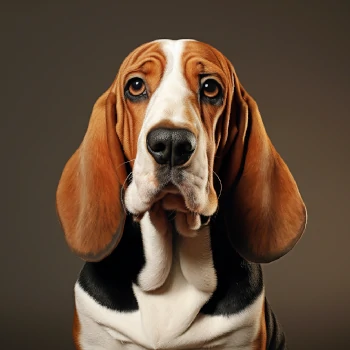
Basset Hound Breed Overview
This breed benefits from both mental and physical exercise, even though they can thrive in apartment living. Daily walks are essential to encourage and maintain their muscle tone, considering their propensity to gain weight easily. Suitable exercises for a Basset Hound include:
However, caution is needed with activities like jumping due to their unique morphology. Sports such as Agility are not recommended, and instead, encouraging their natural tracking instincts or providing a variety of toys and chewables is preferable to divert their attention and prevent unwanted behaviors during their growth and learning phases. Given their aversion to solitude, if you spend extended periods away from home, consider alternative pet options.
Regular grooming is crucial for Basset Hounds, known for shedding profusely (2-3 times a week). This routine helps maintain their coat's beauty and shine. Monthly baths and attentive care for drool and eye discharge are necessary. Special attention should be given to their ears, prone to infections, and their nails, which can grow excessively if not trimmed regularly.
By combining a thoughtfully planned exercise routine with consistent grooming practices, you ensure the happiness and health of your Basset Hound, fostering a strong and lasting bond.
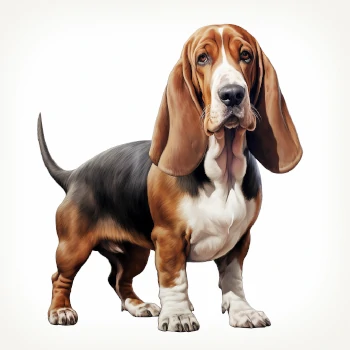
Common Health Challenges in this Breed
While Basset dogs generally enjoy good health, they are not immune to certain conditions throughout their lives. Eye-related issues take the spotlight in their medical history, with conditions like conjunctivitis and glaucoma, leading to a gradual loss of vision.
Anxiety due to lack of affection, atrophied disc hernias from supporting their unique back structure, ear infections, and stomach torsion are three additional health issues that may arise in the life of a Basset Hound. Despite these challenges, the average lifespan for this breed is quite high, reaching around twelve years!
While not prone to frequent illnesses, Basset Hounds may experience conditions such as obesity and hypothyroidism. Excessive weight is particularly concerning due to its impact on their already delicate joints. Joint problems like patellar luxation and elbow dysplasia may also occur, especially if the aforementioned conditions are present. Eye diseases like ectropion or glaucoma can be serious if not detected early.
The elongated build of the Basset Hound, combined with their weight, makes them susceptible to back pain. Observing their willingness or reluctance to climb stairs can indicate potential back issues, especially if they are overweight. Any hesitancy should prompt a visit to the veterinarian. In addition to potential back problems, this breed is also prone to gastric torsion.
Basset Hounds may experience genetic or hereditary issues due to the frequent interbreeding within the breed. Conditions such as hip dysplasia can be a concern. Preventive measures include discouraging them from climbing on furniture or other surfaces to avoid potential disc herniation.
The Basset Hound is susceptible to glaucoma or conjunctivitis if their needs and basic care are not closely monitored. Despite their robust appearance, they require delicate care. Controlling their diet to prevent excessive fat intake is essential to avoid weight-related issues.
By staying vigilant and addressing these potential health concerns early on, you can contribute to the well-being and longevity of your cherished Basset Hound.
How the Basset Hound Became "Hush Puppies"
The Basset Hound earned the nickname "Hush Puppies" due to a popular shoe brand that featured these dogs in its ads. The brand's clever marketing connected the dog's qualities with comfort, leading people to adopt the nickname, showcasing the powerful influence of advertising on cultural perception.
Are Basset Hounds Hypoallergenic?
Basset Hounds are not hypoallergenic. They are moderate shedders, and they tend to shed consistently throughout the year. Although they may not cover your furniture with excessive dog hair, they can still produce enough dander to trigger allergies. While regular grooming, sweeping, and vacuuming can mitigate the issue to some extent, individuals with severe allergies may want to consider other breeds that are more suitable.
Are Basset Hounds Lazy?
At first glance, it may look like Basset Hounds are lazy; they aren’t high-energy dogs. Bassets only need 20-30 minutes of exercise each day and are generally content to spend the rest of the time sleeping or hanging out with you on the couch. But if a strong smell crosses their nose, stand back and watch them spring into action. Unless you intervene, their determined sniffers won’t stop until they track down the source of the scent.
Do Basset Hounds Drool?
Yes, Basset Hounds are known for their drooling tendencies. Their saliva tends to accumulate in their jowls and the folds of skin around their mouth. It's advisable to have a towel readily available to clean up any drool, and anticipate affectionate yet slobbery kisses as well as damp dog toys.
Do Basset Hounds Bark a Lot?
Yes, Basset Hounds are known for their propensity to bark frequently. They have a distinctively loud, baying-like bark, which they often use to express excitement or frustration. Additionally, due to their skin and ear structure, Basset Hounds may also drool and emit odors.
Are Basset Hounds Prone to Obesity?
Yes, Basset Hounds are prone to obesity. This breed is particularly susceptible to weight gain, and many of their health issues can be linked to being overweight. Owners play a crucial role in preventing obesity-related complications such as aggravated arthritis, back problems, and heart issues by ensuring their Basset Hound maintains a healthy weight through proper diet and exercise.
How Much Exercise Does a Basset Hound Need?
Basset Hounds are moderate-energy dogs that benefit from daily walks and playtime. Aim for 30-60 minutes of exercise per day, adjusting based on age and health. Consistency is key to keeping your Basset healthy and happy.
Preventing Obesity in Basset Hounds
Obesity is a common issue in Basset Hounds due to their love of food and sedentary nature. To prevent weight gain, provide a balanced diet, control portion sizes, and ensure regular exercise. Monitor your Basset's weight and adjust their diet and activity levels as needed to maintain a healthy weight.
Are Basset Hounds stubborn?
Yes, Basset Hounds are known for their stubborn nature. They often exhibit strong willpower and can be challenging to train if their stubborn behavior is not properly addressed. However, with patience, consistency, and appropriate training techniques, it is possible to work with their stubbornness and achieve positive results in their education.
Is a Basset Hound a good family dog?
Yes, Basset Hounds are generally considered good family dogs. They have a friendly and affectionate disposition, making them excellent companions for families of all sizes. Their gentle and tolerant nature makes them particularly well-suited for households with children. However, it's important to note that Basset Hounds can be stubborn and independent at times, so consistent training and socialization are essential to ensure they are well-behaved members of the family.
How long can a Basset Hound be left alone?
Basset Hounds shouldn't be left alone for more than 4-6 hours at a time. They thrive on companionship and leaving them alone for too long can lead to boredom and anxiety. It's important to provide them with mental stimulation and interaction with their human family members to ensure their well-being.
Do Basset Hounds tend to be aggressive?
Basset Hounds are generally not known for aggression. They usually have a calm and friendly demeanor. However, like any breed, individual personalities can vary, and proper training and socialization are essential to ensure they develop into well-behaved and non-aggressive pets.
What vaccinations do Basset Hounds need?
Basset Hounds typically require vaccinations against common canine diseases such as distemper, parvovirus, and adenovirus. The C3 vaccination covers these core diseases, while the C5 vaccination includes protection against additional diseases such as canine cough (Bordetella) and canine influenza. Consult with your veterinarian to determine the most appropriate vaccination protocol for your Basset Hound based on their lifestyle and potential exposure to infectious agents.
For more detailed information on vaccinations for Basset Hounds, please visit our comprehensive guide to canine vaccinations.